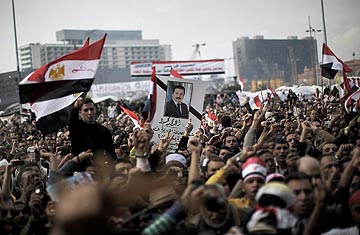
Egyptian antigovernment demonstrators stage a symbolic funeral on Feb. 7 for journalist Ahmed Mohammed Mahmud (picture), who was killed during clashes with pro-government supporters on Feb. 4, at Cairo's Tahrir Square. The funeral took place during the 14th day of protests calling for the ouster of President Hosni Mubarak
Until this month, Shahira Amin had a dream job with a good salary, travel and star status. Then, on Feb. 2, she was driving across Cairo to work as the senior anchor for the government-owned Nile Television channel when she heard a huge roar of chants from tens of thousands of protesters in Tahrir Square, the heart of Egypt's uprising, two blocks from her office. She parked the car, wandered into the square — and never really came out. Overwhelmed at the spectacle, she made a life-changing decision on the spot. "I sent my boss a text message, saying, 'Forgive me, I am not coming back. I am with the people, not the regime.' "
Having hung up her suit jackets at home, Amin, 51, now spends her days in jeans and sweatshirts amid the feverish protests in the square, shouting for the ouster of a man she knows well: President Hosni Mubarak. For years, as presidential correspondent, Amin accompanied the Egyptian leader to countless destinations, from the Elysee Palace in Paris to George W. Bush's ranch in Crawford, Texas. "Mubarak is a nice guy," she says. "But he is in denial. He does not understand why people want him to leave."
One reason for that disconnect, says Amin, is the tightly controlled propaganda machine Mubarak built over 30 years in power — it spins a glossed-over version of his repressive rule that he himself might have come to believe. Designed (before the Internet) to suppress every critical word against the government, the system controls the flow of information, relying overwhelmingly on state-run television, which for decades has told Egyptians that Mubarak is their best hope for peace and progress.
In that, television stars like Amin — a handsome woman with big eyes, a broad smile and a commanding presence — have been key. For years she traveled to international summits and broke stories, including controversial ones like Egypt's widespread use of female circumcision and the deaths of Sudanese refugees in 2006 at the hands of Egyptian security police. After the latter story, a security officer warned Amin that she could "disappear off the face of the earth," she says. She didn't. A single mother supporting two children, she opted to stay and try to push the limits, quizzing government ministers on air in ways that made her co-anchor squirm. And for the most part, Amin got away with it — perhaps even giving audiences the impression that the channel offered varied political views.
But the revolution changed all that. On Feb. 1, Amin arrived at work to read the news and was handed a script by the channel's management, which focused on pro-Mubarak rallies in Cairo that day. The hundreds of thousands of enraged protesters in Tahrir Square chanting "Mubarak get out!" were almost within earshot of the office a short walk away. Yet Amin was ordered to tell viewers that the antiregime protest "was about poverty," she says. "We never once said the protesters wanted Mubarak out." The middle ground where Amin had maneuvered for years had vanished, and, she says, "for the first time I felt cornered."
So too did Soha Ennakkash, a news presenter on a sister state-run channel, Nile News. On Jan. 26, the day after Egypt's revolt exploded, Ennakkash, like Amin, was handed a news script by the channel's director. Every hourly bulletin led with six short words: "Calm has been restored in Cairo." How did Ennakkash know it was a lie? For one thing, riot police were downstairs, keeping protesters from storming the television building. And outside the newsroom window, antigovernment activists were fighting pitched battles with police that day, in which at least one person from each side was killed. Ennakkash says she asked her director several times if she could change the newscast's first sentence. "He said he had no margin to move in," she says. So she repeated the reassurance for viewers in all her bulletins that day, saying that calm had prevailed. "I will never forget that sentence for the rest of my life," she says. She went home that night and quit.
Now Ennakkash is at home with her daughter Laila, 9, whose school has been shut since the revolt began. She says she spends hours a day on her Facebook page, on which friends — and total strangers — have bombarded her with congratulatory e-mails and colleagues have slipped discreet messages, telling her that they wish they could follow suit. When I dropped by to visit her one late morning, Ennakkash's husband was sound asleep, having protested all night in Tahrir Square. To Ennakkash, like many Egyptians, the revolt has been transformational. "I felt ashamed before, because I was talking to people onscreen, and there was a pact that 'you can trust me,' " she says. "Now I feel free."
Amin says she too feels "liberated." And like Ennakkash, she has become an instant heroine to Egypt's protesters, thanks to her defection. When I arrived in the square with Amin one afternoon, I saw her surrounded by her former viewers, who asked to have their photographs taken with her, arms linked. "We're so proud of you," said one woman, throwing her arms around Amin. "You did a great thing." One person who has yet to respond, she says, is the boss to whom she sent her life-changing text message. That, perhaps, will have to wait until the revolution has been truly won.
